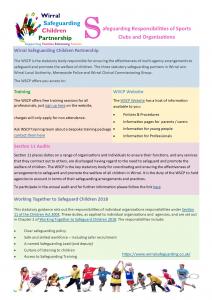Safeguarding Responsibilities of Sports Clubs and Organisations

Wirral Safeguarding Children Partnership
The WSCP is the statutory body responsible for ensuring the effectiveness of multi-agency arrangements to safeguard and promote the welfare of children. The three statutory safeguarding partners in Wirral are: Wirral Local Authority, Merseyside Police and Wirral Clinical Commissioning Group.
The three safeguarding partners are committed to providing a safeguarding system in Wirral where:
- excellent practice is the norm, and can be seen in common across services
- partner agencies hold one another to account effectively, and improvement
- results there is early identification of, and co-owned action on ‘new’ safeguarding issues
- learning is promoted and embedded, and its effects can be proven
- information is shared effectively and translates into knowledge that informs practice
- the public are engaged in safeguarding all children and feel confident that children are protected from harm
Working Together to Safeguard Children 2018
This statutory guidance sets out the responsibilities of individual organisations responsibilities under Section 11 of the Children Act 2004. These duties, as applied to individual organisations and agencies, and are set out in chapter 2 of Working Together to Safeguard Children 2018. The responsibilities include:
- Clear safeguarding policy
- Culture of listening to children
- Safe and skilled workforce – including safer recruitment
- A named safeguarding lead (and deputy)
- Access to safeguarding training
Download the flyer to display in your Clubs and Organisations
Section 11 / 175 Audit
The WSCP is the key statutory body for coordinating and ensuring the effectiveness of arrangements to safeguard and promote the welfare of all children in Wirral. It is the duty of the WSCP to hold agencies to account in terms of their safeguarding arrangements and practices.
The WSCP uses a variety of ways to test the strength of safeguarding arrangements across agencies in Wirral but one of the key ways is by the use of an annual safeguarding audit called the Section 11 Audit (for agencies). Section 11 was issued under the Children Act (2004) and has been reinforced in Working Together to Safeguard Children 2018.
Section 11 places duties on a range of organisations and individuals to ensure their functions, and any services that they contract out to others, are discharged having regard to the need to safeguard and promote the welfare of children including:
- a clear line of accountability for the commissioning and/or provision of services designed to safeguard and promote the welfare of children
- a senior board level lead with the required knowledge, skills and expertise or sufficiently qualified and experienced to take leadership responsibility for the organisation’s/agency’s safeguarding arrangements
- a culture of listening to children and taking account of their wishes and feelings, both in individual decisions and the development of services
- clear whistleblowing procedures, which reflect the principles in Sir Robert Francis’ Freedom to Speak Up Review and are suitably referenced in staff training and codes of conduct, and a culture that enables issues about safeguarding and promoting the welfare of children to be addressed
- clear escalation policies for staff to follow when their child safeguarding concerns are not being addressed within their organisation or by other agencies
- arrangements which set out clearly the processes for sharing information, with other practitioners and with safeguarding partners
- a designated practitioner (or, for health commissioning and health provider organisations/agencies, designated and named practitioners) for child safeguarding. Their role is to support other practitioners in their organisations and agencies to recognise the needs of children, including protection from possible abuse or neglect. Designated practitioner roles should always be explicitly defined in job descriptions. Practitioners should be given sufficient time, funding, supervision and support to fulfil their child welfare and safeguarding responsibilities effectively
- safe recruitment practices and ongoing safe working practices for individuals whom the organisation or agency permit to work regularly with children, including policies on when to obtain a criminal record check
- appropriate supervision and support for staff, including undertaking safeguarding training
- creating a culture of safety, equality and protection within the services they provide
In addition:
- employers are responsible for ensuring that their staff are competent to carry out their responsibilities for safeguarding and promoting the welfare of children and creating an environment where staff feel able to raise concerns and feel supported in their safeguarding role
- staff should be given a mandatory induction, which includes familiarisation with child protection responsibilities and the procedures to be followed if anyone has any concerns about a child’s safety or welfare
- all practitioners should have regular reviews of their own practice to ensure they have knowledge, skills and expertise that improve over time
To participate in the annual audit and for further information please follow the link here
Sports Clubs / Organisations
- There are many sports clubs and organisations including voluntary and private sector providers that deliver a wide range of sporting activities to children. Some of these will be community amateur sports clubs, some will be charities. All should have the arrangements described in place and should collaborate to work effectively with the safeguarding partners as required by any local safeguarding arrangements. Paid and volunteer staff need to be aware of their responsibilities for safeguarding and promoting the welfare of children, how they should respond to child protection concerns and how to make a referral to local authority children’s social care or the police if necessary. (2.63 Working Together to Safeguard Children 2018)
- All National Governing Bodies of Sport, that receive funding from either Sport England or UK Sport, must aim to meet the Standards for Safeguarding and Protecting Children in Sport.
Standards for Safeguarding and Protecting Children In Sport
Standard 1 Policies & Procedures
- The organisation should have linked procedures that provide clear step by step guidance on what to do in different circumstances if concerns arise about children’s welfare or protection.
Standard 2 Operating Systems
- Operating systems are needed to ensure that policies and procedures are effectively implemented in practice and provide clear step by step guidance on what to do in specific circumstances. They clarify roles and responsibilities, and lines of communication.
Standard 3 Prevention
- Measures to help minimise the possibility of children and young people being abused by those in a position of trust.
Standard 4 Codes of ethics and conduct
- Codes of ethics reflect the values and principles that the organisation wants to promote and provide a moral basis for policies and systems.
Standard 5 Equity
- Measures to ensure that the needs of all children and young people to be protected from abuse are addressed.
Standard 6 Communication
- Ways of informing, consulting and listening to all relevant parties about how children involved in the sport are to be safeguarded.
Standard 7 Education and Training
- Opportunities to develop and maintain the necessary knowledge, skills and understanding to safeguard children.
Standard 8 Access to advise and support
- Arrangements made to provide essential information and support to those responsible for safeguarding children. Children and young people who are being abused are assisted to get help.
Standard 9 Implementation and monitoring
- Action taken to ensure that the organisations intentions in relation to safeguarding children are taking place, and to monitor and evaluate action and effectiveness.
Standard 10 Influencing
- Action taken by the organisation to influence, encourage and promote the adoption and implementation of measures to safeguard children by partner organisations.
Keeping Children Safe in Clubs, Sports and Activities
As part of a campaign to make parents and carers more aware of the potential dangers of enrolling their children in clubs and activities they perhaps know little about the safeguarding board has published a series of awareness raising posters which can be downloaded below:
https://www.wirralsafeguarding.co.uk/keeping-children-safe-in-clubs-sports-and-activities/
How Wirral Safeguarding Children Partnership can Support your Organisation
Wirral Safeguarding Children Partnership is keen to support all sporting organisations to provide a safe and fun environment in which children can flourish. You can get further advice by visiting the WSCP website here
We are also on hand to discuss your training requirements and can offer bespoke courses (at an additional cost) to support organisations if required. Email the training team to discuss your requirements.

